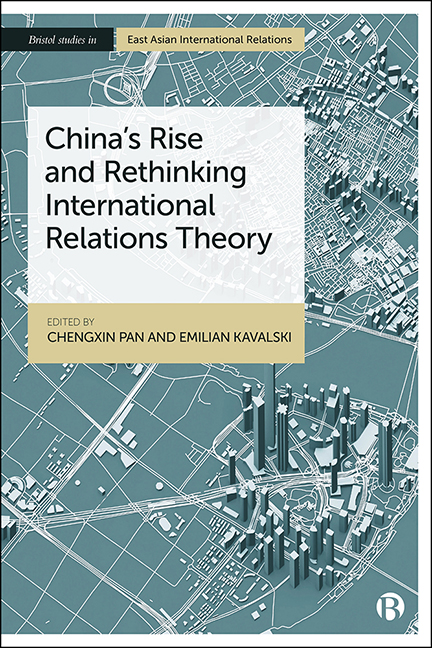Book contents
- Frontmatter
- Contents
- List of Abbreviations
- Notes on Contributors
- Acknowledgements
- Introduction: The Rise of China and Its Challenges to International Relations Theory
- PART I Theorizing China’s Rise: Beyond Eurocentric Knowledge Production
- PART II Theorizing China’s Rise: Critical Reflection on Mainstream Frameworks
- Epilogue: Towards International Relations beyond Binaries
- Index
6 - China in the International Order: A Contributor or a Challenger?
Published online by Cambridge University Press: 15 September 2022
- Frontmatter
- Contents
- List of Abbreviations
- Notes on Contributors
- Acknowledgements
- Introduction: The Rise of China and Its Challenges to International Relations Theory
- PART I Theorizing China’s Rise: Beyond Eurocentric Knowledge Production
- PART II Theorizing China’s Rise: Critical Reflection on Mainstream Frameworks
- Epilogue: Towards International Relations beyond Binaries
- Index
Summary
The rapid growth of China's power and influence has become one of the most salient phenomena in world politics today. Particularly since 2012, when President Xi Jinping became China's top leader, China has been viewed as increasingly ‘assertive’ in conducting its foreign relations. Henry Kissinger (2014), in his book World Order, devotes an entire chapter to the complex and subtle relations between China and the international order. As he observes,
Beijing has become much more active on the world scene. … By any standard, China has regained the stature by which it was known in the centuries of its most far-reaching influence. The question now is how it will relate to the contemporary search for world order, particularly in its relations with the United States. (Kissinger, 2014: 225– 6)
Likewise, John Ikenberry (2011: 343), a prominent professor of international affairs at Princeton University, remarks that ‘China is in critical respects the “swing state” in world politics’, which begs the crucial question: ‘Will China seek to oppose and overturn the evolving Western-centred liberal international order, or will it integrate into and assert authority within that order?’
There are three different answers to this question in China as well as in other parts of the world. The first answer is that for the sake of its own interest, China needs to integrate into the existing international order, rather than overturn it, albeit with some reforms (Da, 2021; see also Chapter 7). In his speech in the United States in September 2015, Xi Jinping (2015) pronounced that
[a] s far as the existing international system is concerned, China has been a participant, builder and contributor. We stand firmly for the international order and system that is based on the purposes and principles of the UN Charter. A great number of countries, especially developing countries, want to see a more just and equitable international system, but it doesn't mean they want to unravel the entire system or start all over again. Rather, what they want is to reform and improve the system to keep up with the times. At the BRICS (Brazil, Russia, India, China, and South Africa) Brasilia Summit in November 2019, Xi restated this commitment: ‘It is important that we uphold the purposes and principles of the United Nations (UN) Charter and the UN-centred international system, oppose hegemonism and power politics, and take a constructive part in settling geopolitical flash points’.
- Type
- Chapter
- Information
- China’s Rise and Rethinking International Relations Theory , pp. 125 - 144Publisher: Bristol University PressPrint publication year: 2022



